For all his show of contempt for the West, Russian dictator Vladimir Putin has one great fear.
He is afraid of Nato. The military might of the Western transatlantic alliance far outguns anything his war-ravaged country can muster.
Nato’s arsenal of long-range ballistic missiles, its phenomenal powers of intelligence gathering, its utter supremacy in air power and space communications, and – above all – its vast array of nuclear weapons, guarantee that Russia can never be victorious in a global conflict with the West.
Of course, Nato is a defensive alliance and has no ambitions to threaten Moscow – unless it is attacked. But Putin dare not challenge its power.
What he most certainly does not fear, however, is a European defence force co-ordinated by EU bureaucrats. An army commanded from Brussels, the military wing of a sclerotic trading organisation, is a far less intimidating proposition.
Without Nato, any war between Europe and Russia would be a battle between red-tape warriors and the Red Army. Putin is bound to fancy his chances.
By contrast, the North Atlantic Treaty Organisation is the most powerful, successful, multilateral organisation in the world.
Founded in 1949, it has kept the peace in Europe for more than 75 years. That peace withstood exceptional pressures during the Cold War and the break-up of Yugoslavia.
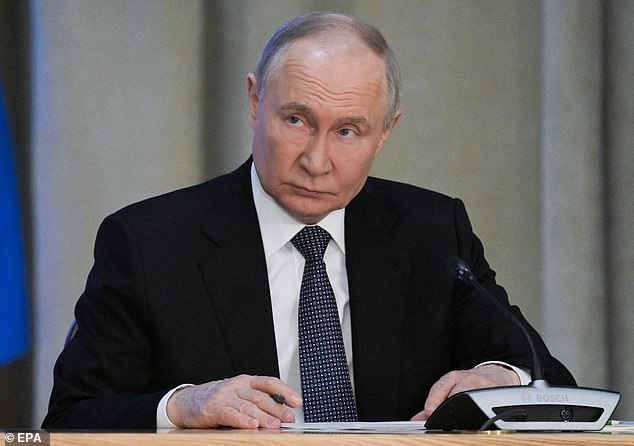
For all his show of contempt for the West, Russian dictator Vladimir Putin (pictured) has one great fear
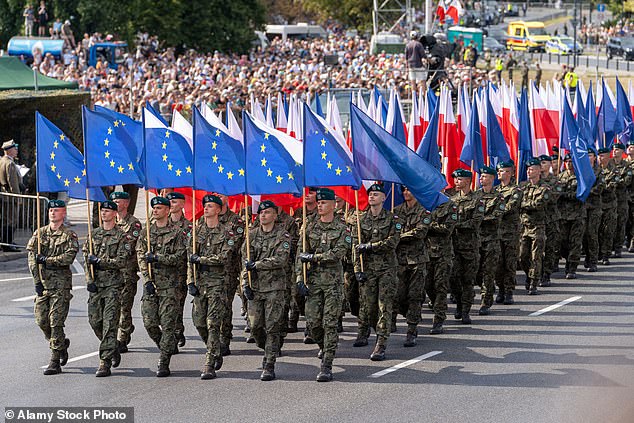
He is afraid of Nato. The military might of the Western transatlantic alliance far outguns anything his war-ravaged country can muster (servicemen of the Polish Army marching with Polish and NATO flags)
The stability of Nato is the main reason we were not plunged into World War III during the Berlin airlift of 1961, the Cuban missile crisis the following year and on several other occasions.
The West owes its prosperity to the unwavering mutual commitment to defence that Nato provides. To abandon it now, when Russia is posing a more ominous threat than most of us can remember in our lifetimes, would be madness.
But the EU is actively seeking to loosen ties to Nato in response to President Donald Trump’s entirely reasonable demand that Europe should pay its fair share of its budget. Why should America bear the brunt of guaranteeing freedom in Belgium, France or Germany, he asks.
Most would agree, at the very least, he has a strong argument.
In response, the European Commission announced on Wednesday €150 billion (£126bn) in loans to member states for defence spending, not to invest in Nato but to build a new EU-driven defence force for Europe.
The commission’s president, Ursula Von der Leyen, describes this as, ‘air and missile defence, artillery systems, missiles and ammunition drones, and anti-drone systems’. It will be known as the Security Action For Europe (Safe) scheme.
This is not done out of sulkiness, raising two fingers at America for daring to suggest Europe is not pulling its weight. It’s a cynical, calculated power grab. The EU is using this moment of great international peril to position itself as an emerging military superpower.
The stupidity of that cannot be overstated. History shows that whenever France and Germany seek to become over-mighty, catastrophe follows. Even as a trading bloc, the EU alliance has been so cumbersome and inept that some member states such as Greece have suffered economic collapse. Britain opted to quit in 2016 rather than be dragged down.
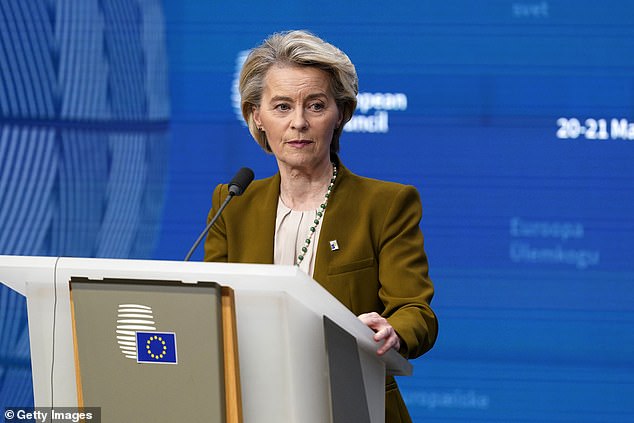
The commission’s president, Ursula Von der Leyen (pictured), describes this as, ‘air and missile defence, artillery systems, missiles and ammunition drones, and anti-drone systems’. It will be known as the Security Action For Europe (Safe) scheme
Yet the mandarins of Brussels persist in their delusions of grandeur, trying to establish their superstate as a world power. What they will achieve is the opposite.
By antagonising the US and splitting Nato, they risk weakening Europe’s defences to the point where Putin can invade without provoking the reaction that he fears most: the hostile opposition of a Nato headed by America.
Nato has stood against Moscow’s imperialistic ambitions, both during the Soviet era and now, when the Russian Federation has transformed itself into an economy dependent on unending war.
Defence has never been the EU’s priority. Its battles have been trade wars, over everything from dairy quotas to the shape of bananas. Its true colours were luridly obvious as soon as the €150billion (£126billion) loan scheme was announced.
British arms companies will be excluded from the SAFE fund, unless the UK signs a security pact with the EU that, nonsensically, is tied to fishing rights. Unsurprisingly, it is the French government behind that demand.
How appalling, but how predictable, that when the West faces its greatest threat for decades, with hundreds of thousands of troops dying on the border of Europe, the French see an opportunity to press for some advantage on fisheries.
It symbolises why Nato must never be replaced by a political organisation. Our defence must not be dependent on the resolution of squabbles in the EU debating chamber. Russia would find these laughably easy to exploit.
Sir Keir Starmer, eager to find new ways of restoring close ties with the EU, will no doubt be keen to plunge us into the Euro defence partnership. Already, a UK-EU summit to discuss the SAFE project is pencilled in for mid-May.
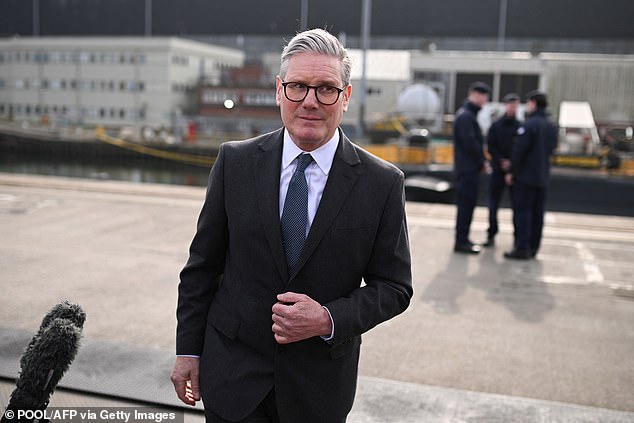
Sir Keir Starmer, eager to find new ways of restoring close ties with the EU, will no doubt be keen to plunge us into the Euro defence partnership. Already, a UK-EU summit to discuss the SAFE project is pencilled in for mid-May
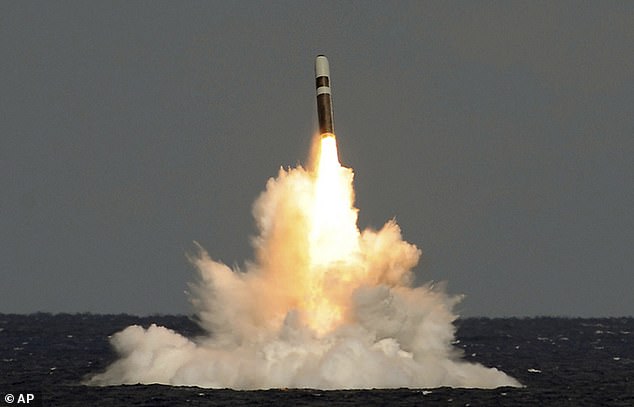
This video grab released on Wednesday Feb. 21, 2024 by the Ministry of Defence shows a missile firing from HMS Vigilant, which fired an unarmed Trident II (D5) ballistic missile
But defence spending should always be the priority of individual nation states, not dictated by unelected bureaucrats from other countries.
No one in the UK voted for Von der Leyen as president of the commission, for example. She wasn’t even elected by a European vote. Unlike the US presidential system, the EC president is appointed by consensus of the member states. It’s fundamentally undemocratic.
Despite this, the EC’s High Representative of Foreign Affairs and Security Policy, Kaja Kallas, called last month for Europe to replace the US as the guardian of freedom. ‘Today, it became clear that the free world needs a new leader. It’s up to us, Europeans, to take this challenge,’ the former prime minister of Estonia said on X.
Such inflammatory statements are calculated to insult the US president and degrade our ties with our most powerful ally. What a gift to Russia.
The obvious reality is that, without America, the UK and Europe cannot defend themselves. That’s not a slur on our courage or the professionalism of our armies. The British Army still sets the standards for the rest of the world. But much of our equipment relies on US technology.
Even where armaments are British-made, they may well require American components, guidance systems or patented mechanisms. If that co-operation is withdrawn, the effect on our defences will be incalculable.
We’ve already seen this month what happens when America withholds the sharing of its intelligence, as it did briefly in Ukraine. To deliberately provoke American ire, when we have no way of replacing what they provide, is insanity.
So too is the EC’s apparent long-term goal of establishing its own defence force. We cannot allow Nato to atrophy while an alternative is built up, let alone an alternative that depends on the political behemoth that is the EU.
At the heart of this unworkable, suicidally dangerous plan is the delusional ambition of the EU to become a world superpower.
We must not succumb to this madness. It benefits no one but Vladimir Putin.
Nile Gardiner is a former aide to Margaret Thatcher and lives in Washington